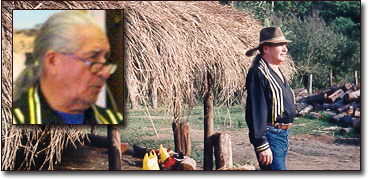|
INDIGENOUS CONFERENCE
Invisible persistent chemical build up in
the food chain is threatening the culture and future survival of
indigenous peoples, participants attending the International pre-summit
conference on sustainable development were told.
"... these organic pollutants contaminate the traditional food web, violate
Indigenous rights, and passes from one generation to the next during
pregnancy causing cancer, disabilities and other related serious health problems "Chief Oren Lyons of Onondaga Nation and Faithkeeper, Turtle Clan,
North America said.

Chief Oren Lyons -- Onondaga Nation
Chief Lyons said as an implementation target of the World Summit on
Sustainable development, all governments must commit to urgently ratifying
the Stockholm convention on Persistent organic pollutants.
" ... we must come up with a sustainable plan of action that will reverberate
all over the globe from Kalahari desert in South Africa to the rain
forests of Africa. The Americas and beyond the Pacific with a loud
rallying call of save our planet and its first people now for tomorrow
never comes", Lyons told the participants, as the conference entered the
second day at Hoffe Park in Kimberley, a northern Cape town of South
Africa.
"... we have a lot to say in the forthcoming world summit, we know our mother
earth, we understand the word respect, somehow we must search for it"
Lyons added.
 Pauline Tangiora,
Maori, from New Zealand, a leader of Southern Star
Association and a member of the World forum for fisher peoples, said many
people have suffered and continue to suffer from nuclear testing in the
Pacific. Pauline Tangiora,
Maori, from New Zealand, a leader of Southern Star
Association and a member of the World forum for fisher peoples, said many
people have suffered and continue to suffer from nuclear testing in the
Pacific.
"What is happening to climate changes is leading to migration, people of
Tonga islands, are moving away from their ancestral lands, the Asian
migration is coming because their islands is being affected, and its not
just the case of looking at where the effects of the wind change, the
climate is, the whole thing is actually activating the movement of people" Tangiora lamented.
As part of an action plan the indigenous communities stressed the need of
making governments to be coherent with their environmental policies,
conservation and adequate management of indigenous peoples' forests and
stopping licenses for oil exploitation blocks
"Now is the time, the children of many nations. Its now time children from
many continents around the world, that we must ensure that the governments
of the world addressed our problems. For many years, the resources of
developing nations have been used to flourish the rich nations, we must
say no to such exploitations" urged the premier of North Cape province of
South Africa, Emsley Dipico said as he rallied the participants, for the
world summit on sustainable development scheduled for this weekend, at
Johannesburg, South Africa.
The Indigenous peoples' pre-summit is expected to conclude on Friday, the
23rd of August, 2002 from where the delegates proceed to Johannesburg for
the Summit.
Back
Atrás
|

 Pauline Tangiora,
Maori, from New Zealand, a leader of Southern Star
Association and a member of the World forum for fisher peoples, said many
people have suffered and continue to suffer from nuclear testing in the
Pacific.
Pauline Tangiora,
Maori, from New Zealand, a leader of Southern Star
Association and a member of the World forum for fisher peoples, said many
people have suffered and continue to suffer from nuclear testing in the
Pacific.